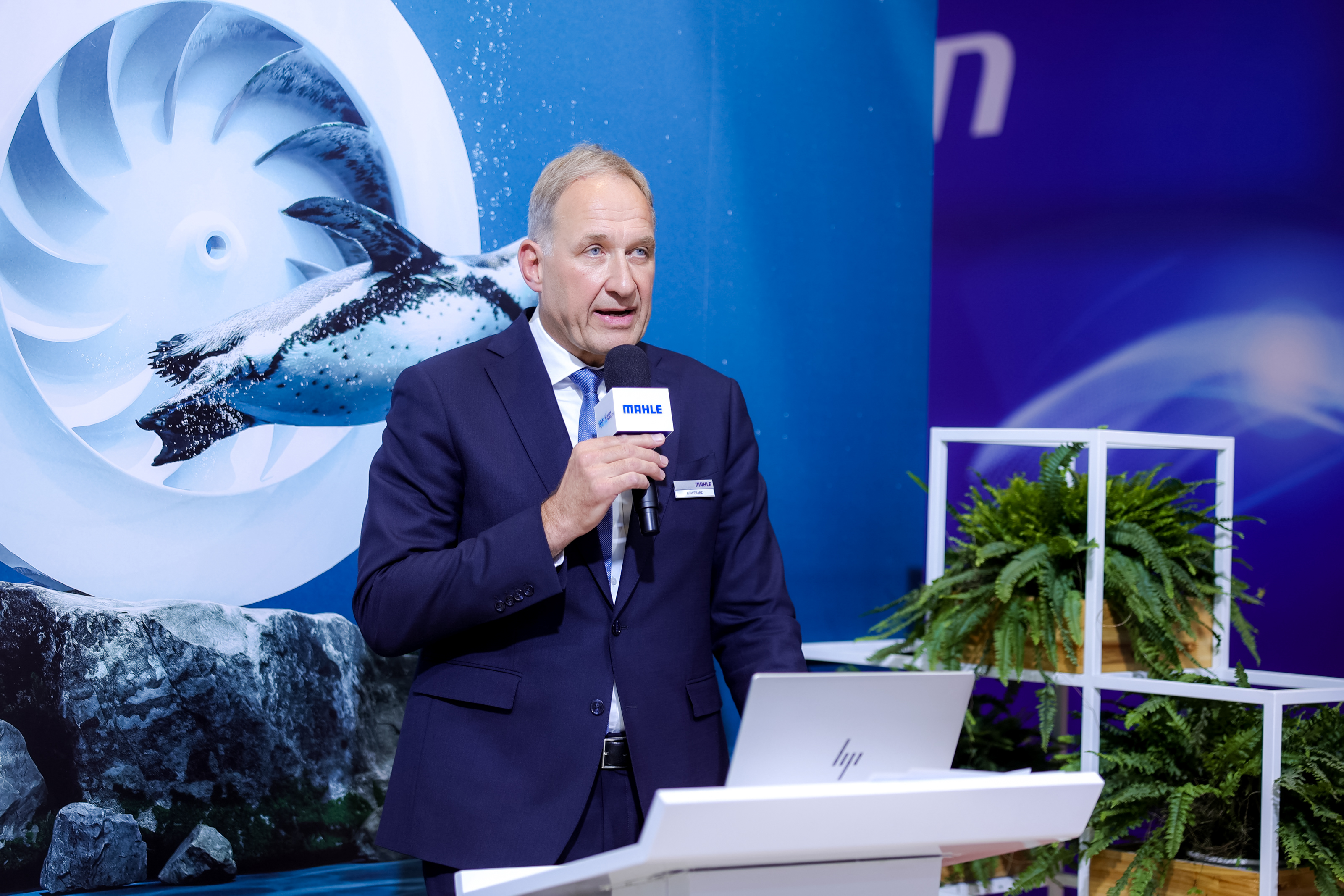 MAHLE's Bionic Radial Blower for Cars' Aircon Systems Makes Global Debut at Shanghai Auto Show
MAHLE's Bionic Radial Blower for Cars' Aircon Systems Makes Global Debut at Shanghai Auto Show(Yicai) April 24 -- German car parts manufacturer MAHLE brought its new bionic radial blower for automotive air conditioning systems at the 21st Shanghai International Automotive Industry Exhibition, marking its first global appearance.
Developed with the use of artificial intelligence to optimize both structure and performance, the radial blower features aerodynamic fan blades modeled after the fins of a penguin, improving efficiency by about 15 percent and reducing sound output by 60 percent compared with similar fans.
The Auto Shanghai 2025 kicked off yesterday at the National Exhibition and Convention Center. MAHLE is attending the 10-day event in a 300-square-meter booth, more than double the size of its booth at the International Motor Show Germany in Munich, showing the firm's commitment to the Chinese market.
MAHLE's new radial blower marks a significant advancement in the efficiency of in-vehicle cooling systems as it combines inspiration from nature with advanced AI technologies to meet the future demands of automotive engineering, Arnd Franz, the company's Chief Executive Officer, said at the product’s launch event yesterday.
"What makes this truly revolutionary is not only the technology itself but how we developed it," noted Franz, who is also MAHLE's Chairman of the Management Board.
"The application of AI has been enormously useful in the optimization of the bionic radial blower," said Uli Christian Blessing, Vice President for the research and development of thermal and fluid systems at MAHLE.
"Our engineers guided the AI and provided it with data and information, enabling it to create more than 30 million virtual designs in a very short time," Blessing explained. “Internally, we are referring to this as 'superhuman engineering.'”
The bionic radial blower sits in front of the cabin filter and the evaporator and makes the design of the aircon system symmetrical and narrow, which creates more space for other components. This is crucial advantage, especially in battery electric vehicles where installation space is scarce, Franz pointed out.
The product is expected to enter mass production within one-to-two years, according to Franz. It has already received inquiries from numerous customers within hours of its debut, Lydia Shen, MAHLE's China president, told Yicai yesterday.
China Is Key to MAHLE's Global Strategy
Franz also took an exclusive interview with Yicai at the Auto Shanghai yesterday. He discussed the role of China in MAHLE's global strategy. The company has 30 production facilities, 7000 employees and more than 500 engineers in China.
"If we want to bring a new technology to the road and do it fast, we have to do it in China," Franz said. “If we can be successful in China, we will be successful everywhere.”
Battery EVs accounted for about 25 percent of new vehicle registrations in China last year, compared to 13 percent in Europe and 8 percent in the United States, Franz noted. "The only region that really meets our original forecast is China, whereas the other markets are dramatically slower," he added.
"China is on track with our expectations, but we see individual manufacturers growing much faster than anticipated," Franz said. “This is very interesting for us because we want to align with winners and adapt our products to fit their needs.”
Franz highlighted how quickly the Chinese market is evolving, noting that many carmakers who started with internal combustion engines are now rapidly transitioning to EVs. “We believe we'll make good progress in this dynamic environment.”
MAHLE has implemented significant organizational changes to fit in the evolving market environment. At the beginning of this year, the company reorganized its structure to combine its powertrain business and electrification and merge its traditional filtration with the thermal management operations.
MAHLE also started creating standalone electrification plans, said Franz. "We have learned that there needs to be a balance between electrification products and internal combustion engine products," he explained. "Now, more and more, we are taking the same plants to make products for both worlds and then balance the portfolio mix as the market requires.
"We have increased the autonomy and consistency of our management and project teams in China," Franz said, adding that the firm will adopt similar regional approaches in East Asia and India to adapt to an increasingly regional market.
MAHLE recently secured a EUR200 million (USD227 million) contract to supply direct current-to-direct current converters to an international carmaker for the battery EVs it will release in China, with production set to begin at its Changshu factory in 2028.
Shen also emphasized the importance of being close to Chinese customers. "We're not just responding to needs but anticipating them," she said. “Our engineers work alongside Chinese automakers from the earliest stages to identify pain points before they become problems.”
Trade Tensions and Future Outlook
"We are a big promoter of free trade," Franz said when asked about the recently growing trade tensions, particularly after the US increased its import tariffs. “MAHLE believes free trade benefits all markets and is especially good for the income, wealth, and well-being of everyone around the world.”
Franz warned that prolonged trade disputes could damage global vehicle production and disrupt established supply chains. “The world economy is a network of talents, and we are now in the process of damaging this network.”
He emphasized the importance of negotiating with partners and reaching agreements quickly.
Despite these challenges, the company's 'MAHLE 2030+' strategy maintains its focus on three key areas -- electrification, thermal management, and components for efficient combustion engines -- and keeps China at the core of its future growth plan.
Editor: Futura Costaglione